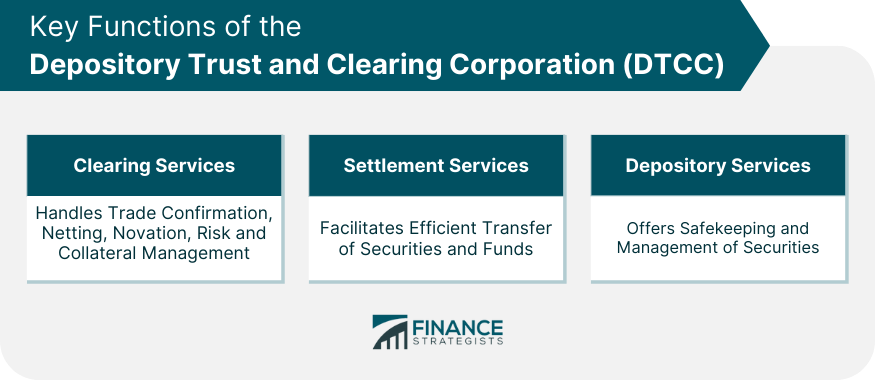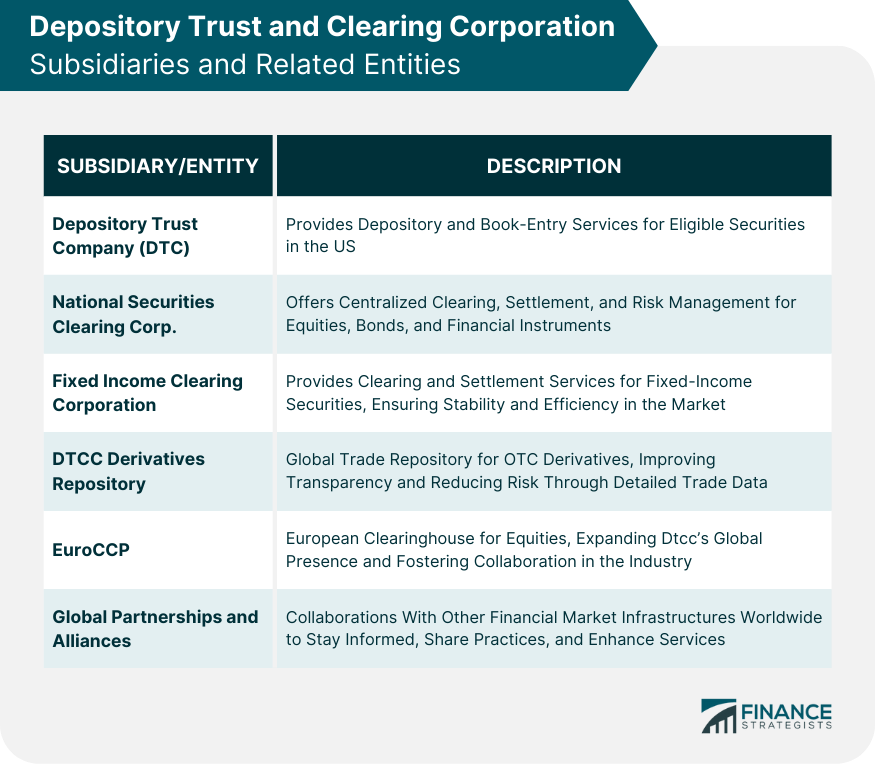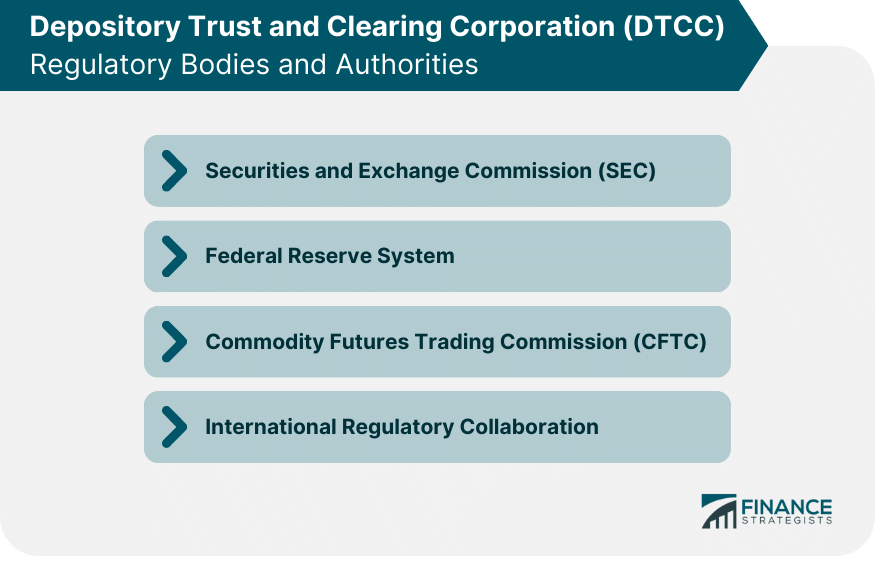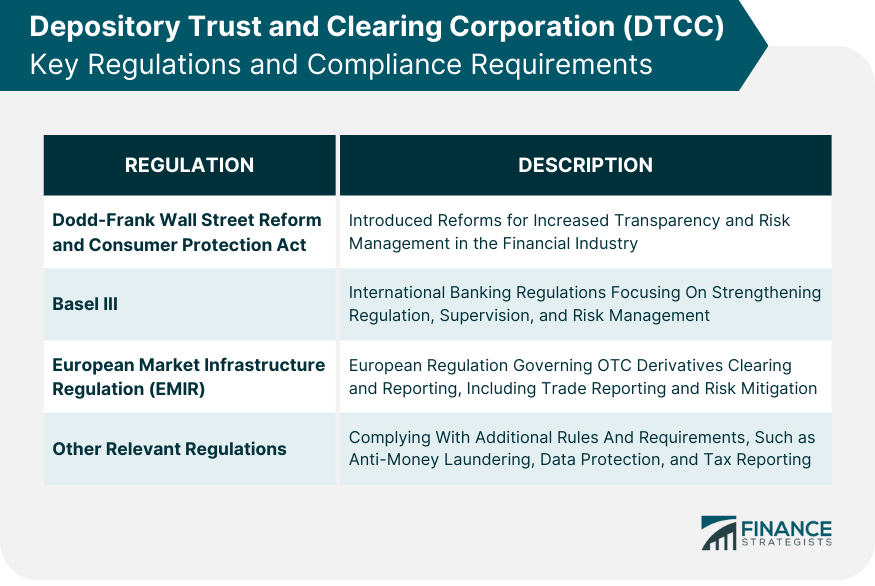The Depository Trust and Clearing Corporation (DTCC) is a prominent financial services company that operates as a central securities depository and a clearinghouse. DTCC serves as a trusted intermediary and provides clearing, settlement, and asset servicing solutions to various participants in the financial industry. Its purpose is to mitigate risks, enhance transparency, and promote stability in the financial markets. By streamlining post-trade processes and managing the flow of securities and funds, DTCC plays a crucial role in fostering confidence and facilitating the smooth functioning of the global financial system. One of the main responsibilities of the DTCC is to provide clearing services for various financial instruments, including equities, fixed income, and derivatives. These services involve trade confirmation and affirmation, netting, and novation, and risk management and collateral management. The DTCC facilitates the trade confirmation process, which involves verifying the details of a transaction between two parties. This process ensures that both parties agree on the terms of the trade, such as the price, quantity, and other relevant details. Once the trade details are confirmed, the DTCC proceeds to the affirmation process, where the transaction is legally binding and ready for settlement. Netting is a critical process in which the DTCC combines multiple transactions between two parties into a single net obligation. This process simplifies the settlement process, reduces the total number of transactions, and lowers overall risk. Novation is the act of replacing the original contract between two parties with a new one, effectively making the DTCC the counterparty to each trade. This process helps manage counterparty risk and ensure the financial system's stability. The DTCC plays a vital role in risk management by providing services such as margining, collateral valuation, and stress testing. These services help identify and mitigate potential risks in the financial system. Additionally, the DTCC offers collateral management services, which involve safeguarding and managing assets used to secure financial transactions. The DTCC is responsible for settling securities transactions, asset servicing, and global tax services. These services ensure the timely and efficient transfer of securities and funds between market participants. The DTCC facilitates the securities settlement process, which involves the exchange of cash and securities between buyers and sellers. The settlement process ensures that market participants fulfill their obligations and that transactions are completed smoothly and efficiently. Asset servicing involves providing various services related to the management and administration of securities. The DTCC offers various asset servicing functions, including corporate action processing, dividend and interest payments, and proxy services. The DTCC provides global tax services to assist clients in complying with tax regulations worldwide. These services include tax withholding and reporting and assistance with navigating complex tax rules and requirements. The DTCC offers depository services, which involve the safekeeping and management of securities on behalf of issuers and investors. These services include securities custody, issuer services, and securities lending. As a central securities depository, the DTCC is responsible for the safekeeping of securities on behalf of its clients. This service ensures the integrity and security of clients' assets and helps prevent fraud and other illicit activities. The DTCC provides various services to issuers, such as the registration and transfer of securities, corporate action processing, and proxy services. These services help issuers manage their securities efficiently and comply with relevant regulations. The DTCC facilitates securities lending transactions, which involve temporarily transferring securities from one party to another in exchange for collateral. Securities lending helps improve market liquidity, facilitates short selling, and generates additional income for the securities owner. The DTCC operates through various subsidiaries and related entities that specialize in different aspects of financial services. These include the Depository Trust Company (DTC), National Securities Clearing Corporation (NSCC), Fixed Income Clearing Corporation (FICC), DTCC Derivatives Repository, EuroCCP, and other global partnerships and alliances. The DTC is a subsidiary of the DTCC that provides depository and book-entry services for eligible securities in the United States. The DTC simplifies the settlement process by allowing participants to transfer securities electronically, thereby reducing the need for physical certificates. The NSCC is a subsidiary of the DTCC that provides centralized clearing, settlement, and risk management services for equities, corporate bonds, municipal bonds, and other financial instruments in the United States. The NSCC helps reduce risk and increase efficiency in the financial market by acting as a central counterparty and netting transactions. The FICC is a subsidiary of the DTCC that provides clearing and settlement services for fixed-income securities, such as U.S. government securities and mortgage-backed securities. The FICC plays a crucial role in maintaining the stability and efficiency of the fixed-income market. The DTCC Derivatives Repository is a global trade repository that stores data on over-the-counter (OTC) derivatives transactions. The repository helps improve transparency and reduce risk in the derivatives market by providing regulators with access to detailed information on trades and positions. EuroCCP is a European clearinghouse that provides clearing and risk management services for equities traded on multiple European trading venues. The DTCC has a stake in EuroCCP, demonstrating its commitment to expanding its global footprint and fostering collaboration in the financial industry. The DTCC actively engages in partnerships and alliances with other financial market infrastructures worldwide. These collaborations help the DTCC stay abreast of global developments, share best practices, and enhance its service offerings. The DTCC is subject to extensive regulatory oversight by various authorities, including the Securities and Exchange Commission (SEC), Federal Reserve System, Commodity Futures Trading Commission (CFTC), and international regulatory collaboration. The SEC is the primary regulator of the DTCC and its subsidiaries in the United States. The SEC oversees the DTCC's activities to ensure that it operates in a safe and sound manner, maintains fair and efficient markets, and protects investors. The Federal Reserve System oversees and supervises the DTCC, focusing on its role as a systemically important financial market utility (SIFMU). The Federal Reserve's oversight aims to ensure the DTCC's financial stability and its ability to continue providing critical services during times of stress. The CFTC regulates the DTCC's activities related to the derivatives market, such as the DTCC Derivatives Repository. The CFTC's oversight ensures that the DTCC complies with relevant regulations and maintains a transparent and stable derivatives market. The DTCC works closely with regulators and industry participants worldwide to promote global regulatory harmonization and enhance the resilience of financial market infrastructures. These collaborations help address cross-border issues and facilitate information sharing among regulators. The DTCC must adhere to numerous regulations and compliance requirements to ensure the stability and integrity of the financial system. Some of these regulations include the Dodd-Frank Wall Street Reform and Consumer Protection Act, Basel III, European Market Infrastructure Regulation (EMIR), and other relevant regulations. The Dodd-Frank Act, enacted in 2010, introduced significant reforms to the financial industry, including increased transparency and risk management requirements for clearinghouses and trade repositories like the DTCC. The DTCC has implemented various measures to comply with the Dodd-Frank Act, such as enhanced reporting and recordkeeping requirements and improved risk management practices. Basel III is a set of international banking regulations that aim to strengthen the regulation, supervision, and risk management of banks and financial market infrastructures. The DTCC has taken steps to ensure compliance with Basel III requirements, including maintaining adequate capital and liquidity levels and implementing robust risk management frameworks. EMIR is a European regulation that governs the clearing and reporting of OTC derivatives transactions. As a global trade repository, the DTCC is subject to EMIR requirements, such as trade reporting, risk mitigation, and collateral management. The DTCC has implemented processes and systems to ensure compliance with EMIR and facilitate smooth cross-border transactions. In addition to the aforementioned regulations, the DTCC must comply with many other rules and requirements in the jurisdictions in which it operates. This includes anti-money laundering (AML) and counter-terrorism financing (CTF) regulations, data protection and privacy laws, and tax reporting requirements. The DTCC has played a critical role in managing and mitigating the impact of financial crises, such as the 2008 financial crisis and the market volatility during the COVID-19 pandemic. During the 2008 financial crisis, the DTCC continued to provide essential clearing, settlement, and depository services, ensuring the financial system's stability. The DTCC's robust risk management practices and operational resilience helped prevent the collapse of the financial infrastructure and mitigated the impact of the crisis on market participants. The COVID-19 pandemic led to unprecedented market volatility, posing significant challenges to the global financial system. The DTCC responded by implementing contingency plans, enhancing its risk management measures, and collaborating with regulators and market participants to ensure the smooth functioning of the financial market. The DTCC has learned valuable lessons from its experiences during financial crises and has used these insights to strengthen its risk mitigation strategies. This includes enhancing its risk management framework, improving operational resilience, and fostering greater collaboration among market participants and regulators. The DTCC is actively embracing technological advancements and innovations to improve its services and maintain its competitive edge in the financial industry. These efforts include automation and digital transformation, distributed ledger technology and blockchain, artificial intelligence and machine learning, and cybersecurity initiatives. The DTCC has implemented various automation and digital transformation initiatives to enhance its operational efficiency and reduce manual processes. This includes the use of robotic process automation (RPA) and other advanced technologies to streamline workflows and improve service delivery. The DTCC is actively exploring the potential of distributed ledger technology (DLT) and blockchain to transform the financial industry. The company has conducted pilot projects and research efforts to assess the viability of using DLT and blockchain to enhance its clearing, settlement, and depository services. By leveraging these technologies, the DTCC aims to increase transparency, reduce operational costs, and improve the overall efficiency of the financial market infrastructure. The DTCC is harnessing the power of artificial intelligence (AI) and machine learning to enhance its risk management, data analytics, and service offerings. By employing AI and machine learning algorithms, the DTCC can gain valuable insights, identify patterns and trends, and make data-driven decisions that improve the overall stability and efficiency of the financial system. As a critical financial market infrastructure, the DTCC prioritizes ensuring the security and integrity of its systems and data. The company invests heavily in cybersecurity initiatives, including implementing robust security measures, adopting best practices, and collaborating with regulators and industry partners to address emerging threats and vulnerabilities. The Depository Trust and Clearing Corporation (DTCC) is a global financial services company that provides clearing, settlement, and depository services for various financial instruments. The DTCC ensures the smooth processing of transactions, reduces risks, and enhances transparency in the financial system. It acts as a trusted intermediary, facilitating secure transfers and settlement of securities. The company offers clearing services, including trade confirmation, netting, and novation, as well as risk and collateral management. It also provides settlement services, asset servicing, and global tax services, ensuring efficient transfer of securities and funds. DTCC's depository services involve safekeeping and management of securities, including custody, issuer services, and securities lending. The DTCC embraces technological advancements such as automation, blockchain, AI, and cybersecurity initiatives to improve its services and address future challenges in the financial industry.What Is Depository Trust and Clearing Corporation (DTCC)?
Key Functions of the Depository Trust and Clearing Corporation (DTCC)
Clearing Services
Trade Confirmation and Affirmation
Netting and Novation
Risk Management and Collateral Management
Settlement Services
Securities Settlement
Asset Servicing
Global Tax Services
Depository Services
Securities Custody
Issuer Services
Securities Lending

DTCC's Subsidiaries and Related Entities
Depository Trust Company (DTC)
National Securities Clearing Corporation (NSCC)
Fixed Income Clearing Corporation (FICC)blockchain
DTCC Derivatives Repository
EuroCCP
Other Global Partnerships and Alliances

Regulatory Framework and Oversight of the Depository Trust and Clearing Corporation (DTCC)
Regulatory Bodies and Authorities
Securities and Exchange Commission (SEC)
Federal Reserve System
Commodity Futures Trading Commission (CFTC)
International Regulatory Collaboration

Key Regulations and Compliance Requirements
Dodd-Frank Wall Street Reform and Consumer Protection Act
Basel III
European Market Infrastructure Regulation (EMIR)
Other Relevant Regulations

Role of DTCC in Financial Crises
2008 Financial Crisis
COVID-19 Pandemic
Lessons Learned and Risk Mitigation Strategies
Technological Advancements and Innovation in the Depository Trust and Clearing Corporation (DTCC)
Automation and Digital Transformation
Distributed Ledger Technology and Blockchain
Artificial Intelligence and Machine Learning
Cybersecurity Initiatives
Conclusion
Depository Trust and Clearing Corporation (DTCC) FAQs
The Depository Trust and Clearing Corporation (DTCC) is a global financial services company that provides clearing, settlement, and depository services for various financial instruments. Established in 1999, the DTCC plays a critical role in maintaining the stability and efficiency of the financial market infrastructure.
The DTCC's key functions include clearing services (trade confirmation and affirmation, netting and novation, and risk management and collateral management), settlement services (securities settlement, asset servicing, and global tax services), and depository services (securities custody, issuer services, and securities lending).
The DTCC operates through various subsidiaries and related entities, including the Depository Trust Company (DTC), National Securities Clearing Corporation (NSCC), Fixed Income Clearing Corporation (FICC), DTCC Derivatives Repository, EuroCCP, and other global partnerships and alliances.
The DTCC is subject to extensive regulatory oversight by various authorities, such as the Securities and Exchange Commission (SEC), Federal Reserve System, Commodity Futures Trading Commission (CFTC), and international regulatory collaboration. The company must adhere to numerous regulations and compliance requirements to ensure the stability and integrity of the financial system.
The DTCC actively embraces technological advancements and innovations to improve its services and maintain its competitive edge in the financial industry. The company's efforts include automation and digital transformation, distributed ledger technology and blockchain, artificial intelligence and machine learning, and cybersecurity initiatives.
True Tamplin is a published author, public speaker, CEO of UpDigital, and founder of Finance Strategists.
True is a Certified Educator in Personal Finance (CEPF®), author of The Handy Financial Ratios Guide, a member of the Society for Advancing Business Editing and Writing, contributes to his financial education site, Finance Strategists, and has spoken to various financial communities such as the CFA Institute, as well as university students like his Alma mater, Biola University, where he received a bachelor of science in business and data analytics.
To learn more about True, visit his personal website or view his author profiles on Amazon, Nasdaq and Forbes.











